Leadership and Management in Early Childhood: Literature Review
VerifiedAdded on 2022/11/28
|12
|2837
|277
AI Summary
This literature review discusses the importance of leadership and management in early childhood education and care settings in Australia. It analyzes five articles that focus on leadership in early childhood education and provides insights into the role of leadership in delivering effective and quality education and care programs. The review also explores the modern and postmodern understanding of leadership in the 21st century.
Contribute Materials
Your contribution can guide someone’s learning journey. Share your
documents today.
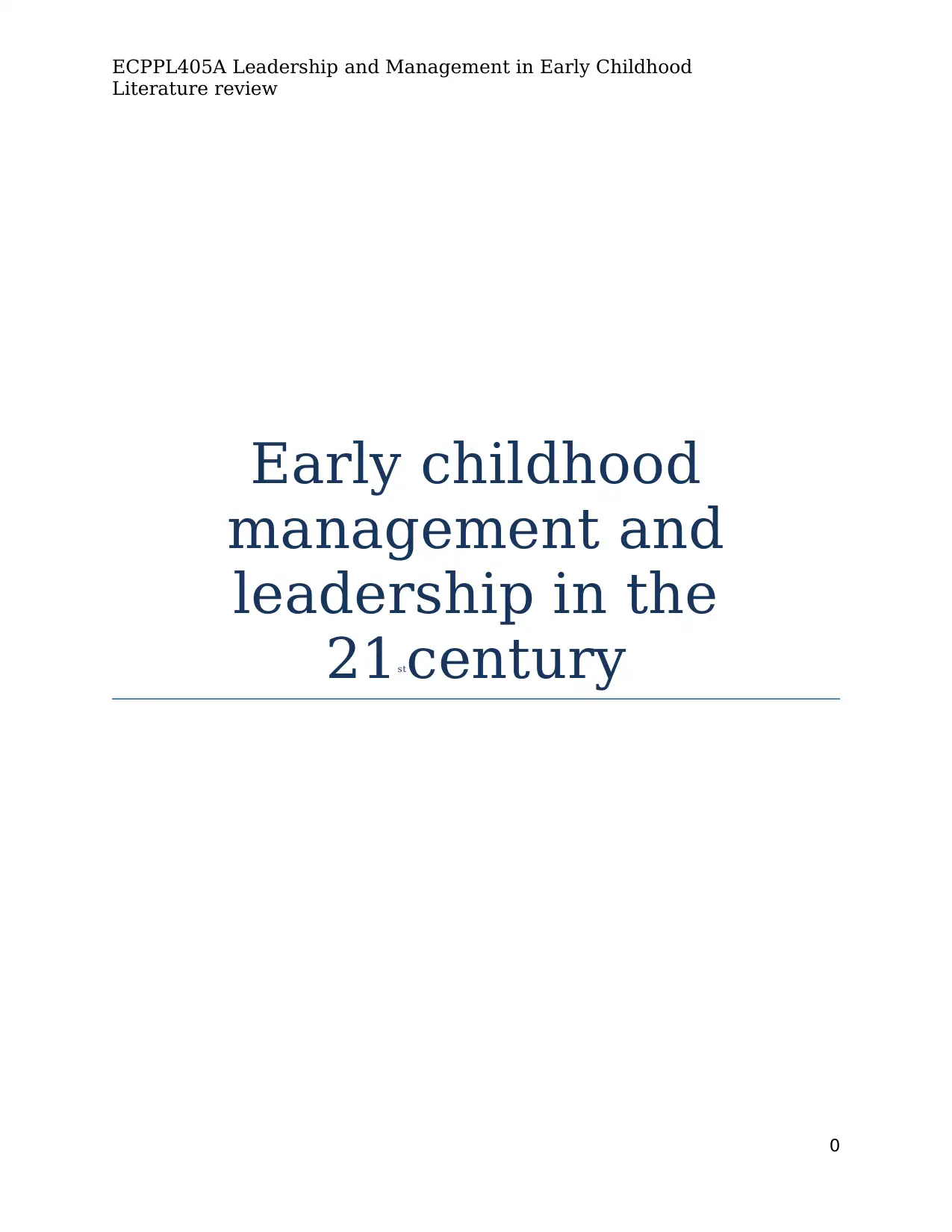
ECPPL405A Leadership and Management in Early Childhood
Literature review
Early childhood
management and
leadership in the
21stcentury
0
Literature review
Early childhood
management and
leadership in the
21stcentury
0
Secure Best Marks with AI Grader
Need help grading? Try our AI Grader for instant feedback on your assignments.
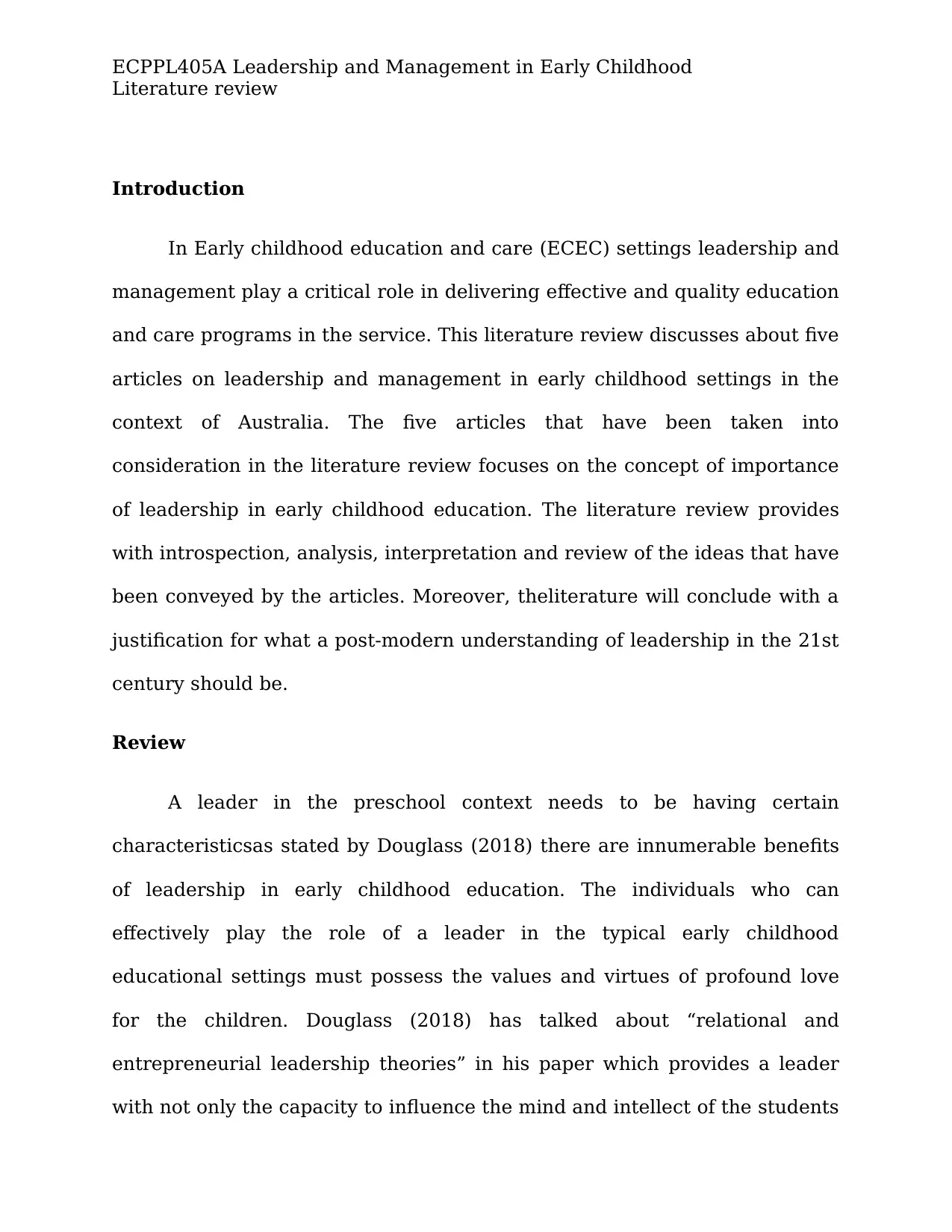
ECPPL405A Leadership and Management in Early Childhood
Literature review
Introduction
In Early childhood education and care (ECEC) settings leadership and
management play a critical role in delivering effective and quality education
and care programs in the service. This literature review discusses about five
articles on leadership and management in early childhood settings in the
context of Australia. The five articles that have been taken into
consideration in the literature review focuses on the concept of importance
of leadership in early childhood education. The literature review provides
with introspection, analysis, interpretation and review of the ideas that have
been conveyed by the articles. Moreover, theliterature will conclude with a
justification for what a post-modern understanding of leadership in the 21st
century should be.
Review
A leader in the preschool context needs to be having certain
characteristicsas stated by Douglass (2018) there are innumerable benefits
of leadership in early childhood education. The individuals who can
effectively play the role of a leader in the typical early childhood
educational settings must possess the values and virtues of profound love
for the children. Douglass (2018) has talked about “relational and
entrepreneurial leadership theories” in his paper which provides a leader
with not only the capacity to influence the mind and intellect of the students
Literature review
Introduction
In Early childhood education and care (ECEC) settings leadership and
management play a critical role in delivering effective and quality education
and care programs in the service. This literature review discusses about five
articles on leadership and management in early childhood settings in the
context of Australia. The five articles that have been taken into
consideration in the literature review focuses on the concept of importance
of leadership in early childhood education. The literature review provides
with introspection, analysis, interpretation and review of the ideas that have
been conveyed by the articles. Moreover, theliterature will conclude with a
justification for what a post-modern understanding of leadership in the 21st
century should be.
Review
A leader in the preschool context needs to be having certain
characteristicsas stated by Douglass (2018) there are innumerable benefits
of leadership in early childhood education. The individuals who can
effectively play the role of a leader in the typical early childhood
educational settings must possess the values and virtues of profound love
for the children. Douglass (2018) has talked about “relational and
entrepreneurial leadership theories” in his paper which provides a leader
with not only the capacity to influence the mind and intellect of the students
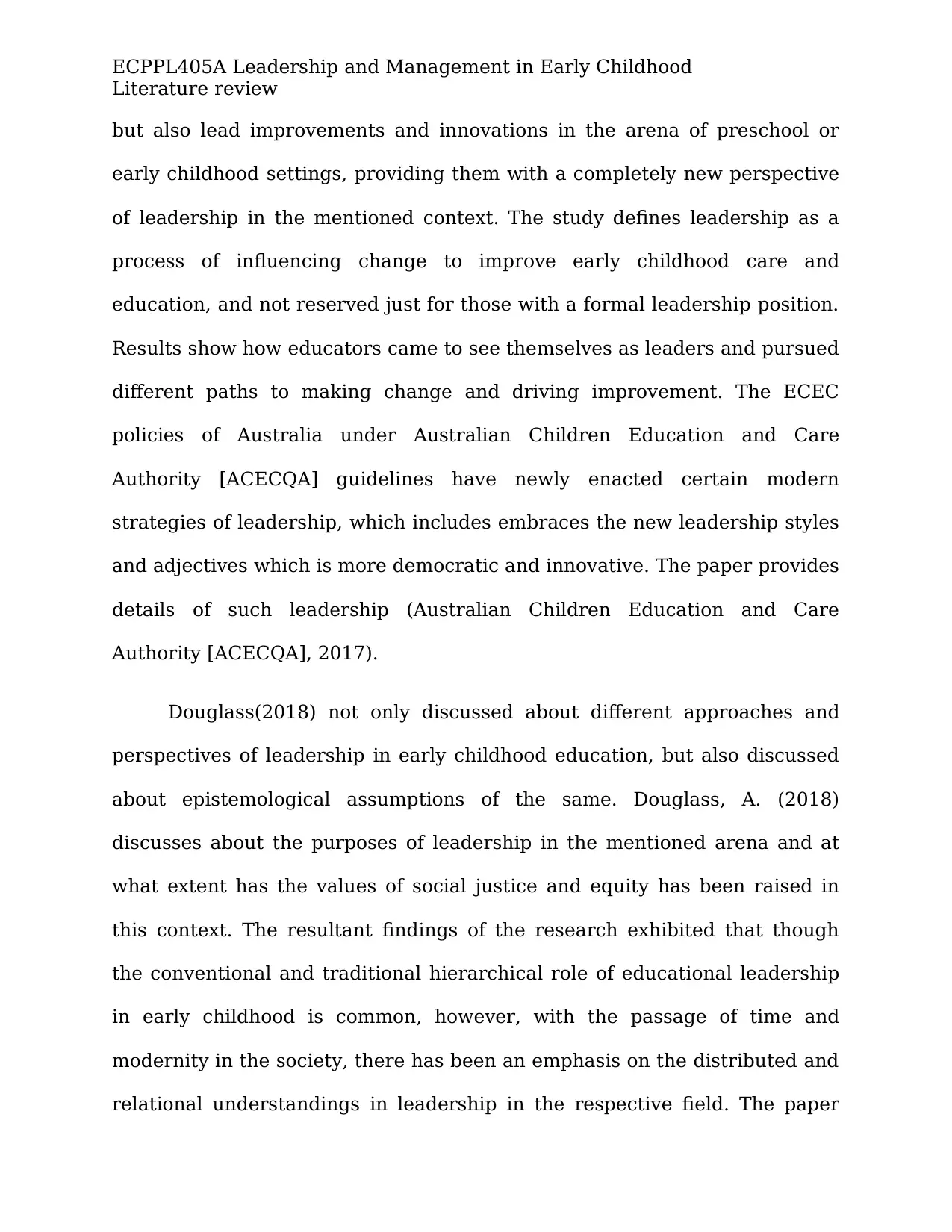
ECPPL405A Leadership and Management in Early Childhood
Literature review
but also lead improvements and innovations in the arena of preschool or
early childhood settings, providing them with a completely new perspective
of leadership in the mentioned context. The study defines leadership as a
process of influencing change to improve early childhood care and
education, and not reserved just for those with a formal leadership position.
Results show how educators came to see themselves as leaders and pursued
different paths to making change and driving improvement. The ECEC
policies of Australia under Australian Children Education and Care
Authority [ACECQA] guidelines have newly enacted certain modern
strategies of leadership, which includes embraces the new leadership styles
and adjectives which is more democratic and innovative. The paper provides
details of such leadership (Australian Children Education and Care
Authority [ACECQA], 2017).
Douglass(2018) not only discussed about different approaches and
perspectives of leadership in early childhood education, but also discussed
about epistemological assumptions of the same. Douglass, A. (2018)
discusses about the purposes of leadership in the mentioned arena and at
what extent has the values of social justice and equity has been raised in
this context. The resultant findings of the research exhibited that though
the conventional and traditional hierarchical role of educational leadership
in early childhood is common, however, with the passage of time and
modernity in the society, there has been an emphasis on the distributed and
relational understandings in leadership in the respective field. The paper
Literature review
but also lead improvements and innovations in the arena of preschool or
early childhood settings, providing them with a completely new perspective
of leadership in the mentioned context. The study defines leadership as a
process of influencing change to improve early childhood care and
education, and not reserved just for those with a formal leadership position.
Results show how educators came to see themselves as leaders and pursued
different paths to making change and driving improvement. The ECEC
policies of Australia under Australian Children Education and Care
Authority [ACECQA] guidelines have newly enacted certain modern
strategies of leadership, which includes embraces the new leadership styles
and adjectives which is more democratic and innovative. The paper provides
details of such leadership (Australian Children Education and Care
Authority [ACECQA], 2017).
Douglass(2018) not only discussed about different approaches and
perspectives of leadership in early childhood education, but also discussed
about epistemological assumptions of the same. Douglass, A. (2018)
discusses about the purposes of leadership in the mentioned arena and at
what extent has the values of social justice and equity has been raised in
this context. The resultant findings of the research exhibited that though
the conventional and traditional hierarchical role of educational leadership
in early childhood is common, however, with the passage of time and
modernity in the society, there has been an emphasis on the distributed and
relational understandings in leadership in the respective field. The paper
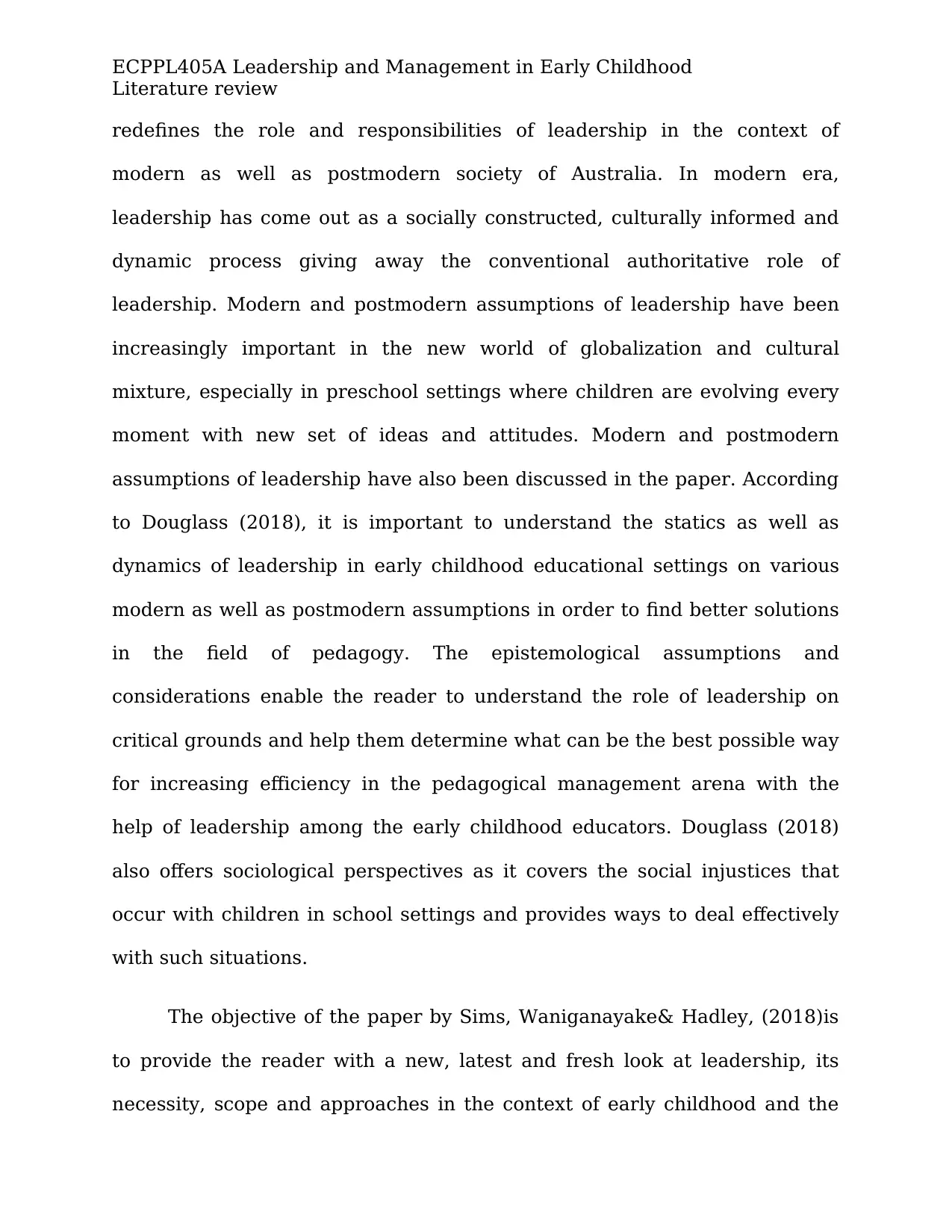
ECPPL405A Leadership and Management in Early Childhood
Literature review
redefines the role and responsibilities of leadership in the context of
modern as well as postmodern society of Australia. In modern era,
leadership has come out as a socially constructed, culturally informed and
dynamic process giving away the conventional authoritative role of
leadership. Modern and postmodern assumptions of leadership have been
increasingly important in the new world of globalization and cultural
mixture, especially in preschool settings where children are evolving every
moment with new set of ideas and attitudes. Modern and postmodern
assumptions of leadership have also been discussed in the paper. According
to Douglass (2018), it is important to understand the statics as well as
dynamics of leadership in early childhood educational settings on various
modern as well as postmodern assumptions in order to find better solutions
in the field of pedagogy. The epistemological assumptions and
considerations enable the reader to understand the role of leadership on
critical grounds and help them determine what can be the best possible way
for increasing efficiency in the pedagogical management arena with the
help of leadership among the early childhood educators. Douglass (2018)
also offers sociological perspectives as it covers the social injustices that
occur with children in school settings and provides ways to deal effectively
with such situations.
The objective of the paper by Sims, Waniganayake& Hadley, (2018)is
to provide the reader with a new, latest and fresh look at leadership, its
necessity, scope and approaches in the context of early childhood and the
Literature review
redefines the role and responsibilities of leadership in the context of
modern as well as postmodern society of Australia. In modern era,
leadership has come out as a socially constructed, culturally informed and
dynamic process giving away the conventional authoritative role of
leadership. Modern and postmodern assumptions of leadership have been
increasingly important in the new world of globalization and cultural
mixture, especially in preschool settings where children are evolving every
moment with new set of ideas and attitudes. Modern and postmodern
assumptions of leadership have also been discussed in the paper. According
to Douglass (2018), it is important to understand the statics as well as
dynamics of leadership in early childhood educational settings on various
modern as well as postmodern assumptions in order to find better solutions
in the field of pedagogy. The epistemological assumptions and
considerations enable the reader to understand the role of leadership on
critical grounds and help them determine what can be the best possible way
for increasing efficiency in the pedagogical management arena with the
help of leadership among the early childhood educators. Douglass (2018)
also offers sociological perspectives as it covers the social injustices that
occur with children in school settings and provides ways to deal effectively
with such situations.
The objective of the paper by Sims, Waniganayake& Hadley, (2018)is
to provide the reader with a new, latest and fresh look at leadership, its
necessity, scope and approaches in the context of early childhood and the
Secure Best Marks with AI Grader
Need help grading? Try our AI Grader for instant feedback on your assignments.

ECPPL405A Leadership and Management in Early Childhood
Literature review
paper also discusses and reflects on the various skills, capabilities and
capacities necessary for effective leadership in early childhood education or
preschool setting. Sims, Waniganayake& Hadley(2018) is studying,
analyzing and interpreting pedagogy and its significance in society.
According toSims, Waniganayake& Hadley(2018) sense making and street-
level bureaucratization of relationship work affected the leadership and
management in ECEC in Australian context. According to the authors, the
street level bureaucracy in the context of ECEC have been observed to be
more focused on monitoring pedagogical documentation, monitoring quality
improvement plan, monitoring and checking programming. The paper had
brought down the limitations of street bureaucracy in the context of early
childhood leadership. The paper focused on 164 early childhood educators
across Australia who were recruited through with a range of online
strategies that included e-mails, newsletters, advertisings on websites and
social media. The data that had been gathered in the paper asks the
questions: who were the ECEL? What was their role in the life of children
and society? How did street level bureaucracy shape their performance in
the role?
The discussions regarding the early childhood education leadership in
the respective paper has been focusing mainly on the age between four to
six years (of the children taken into account in the research). Street level
bureaucracy on compliance with the Australian ECEC polices had been
sharply observed in the paper. Sims, Waniganayake& Hadley(2018) has
Literature review
paper also discusses and reflects on the various skills, capabilities and
capacities necessary for effective leadership in early childhood education or
preschool setting. Sims, Waniganayake& Hadley(2018) is studying,
analyzing and interpreting pedagogy and its significance in society.
According toSims, Waniganayake& Hadley(2018) sense making and street-
level bureaucratization of relationship work affected the leadership and
management in ECEC in Australian context. According to the authors, the
street level bureaucracy in the context of ECEC have been observed to be
more focused on monitoring pedagogical documentation, monitoring quality
improvement plan, monitoring and checking programming. The paper had
brought down the limitations of street bureaucracy in the context of early
childhood leadership. The paper focused on 164 early childhood educators
across Australia who were recruited through with a range of online
strategies that included e-mails, newsletters, advertisings on websites and
social media. The data that had been gathered in the paper asks the
questions: who were the ECEL? What was their role in the life of children
and society? How did street level bureaucracy shape their performance in
the role?
The discussions regarding the early childhood education leadership in
the respective paper has been focusing mainly on the age between four to
six years (of the children taken into account in the research). Street level
bureaucracy on compliance with the Australian ECEC polices had been
sharply observed in the paper. Sims, Waniganayake& Hadley(2018) has
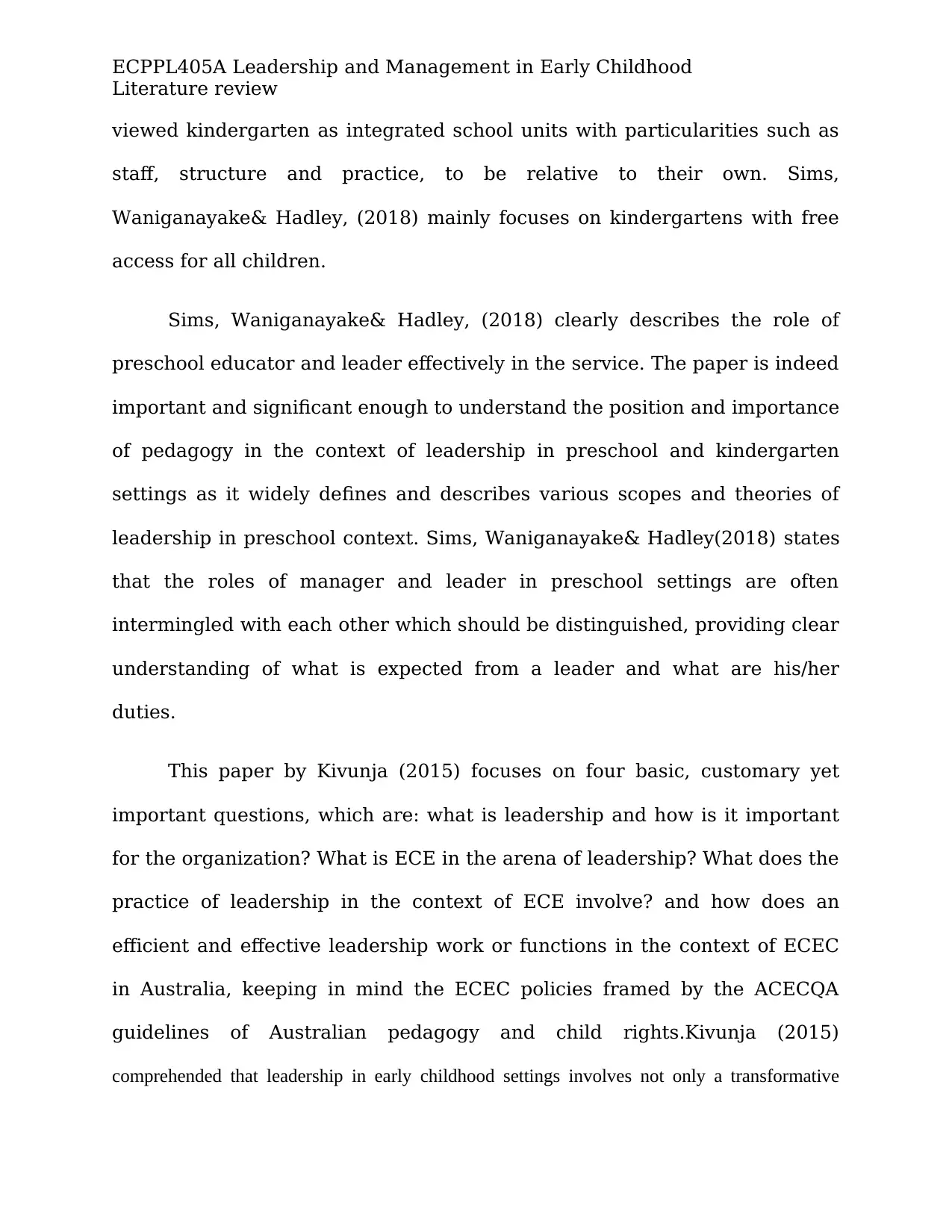
ECPPL405A Leadership and Management in Early Childhood
Literature review
viewed kindergarten as integrated school units with particularities such as
staff, structure and practice, to be relative to their own. Sims,
Waniganayake& Hadley, (2018) mainly focuses on kindergartens with free
access for all children.
Sims, Waniganayake& Hadley, (2018) clearly describes the role of
preschool educator and leader effectively in the service. The paper is indeed
important and significant enough to understand the position and importance
of pedagogy in the context of leadership in preschool and kindergarten
settings as it widely defines and describes various scopes and theories of
leadership in preschool context. Sims, Waniganayake& Hadley(2018) states
that the roles of manager and leader in preschool settings are often
intermingled with each other which should be distinguished, providing clear
understanding of what is expected from a leader and what are his/her
duties.
This paper by Kivunja (2015) focuses on four basic, customary yet
important questions, which are: what is leadership and how is it important
for the organization? What is ECE in the arena of leadership? What does the
practice of leadership in the context of ECE involve? and how does an
efficient and effective leadership work or functions in the context of ECEC
in Australia, keeping in mind the ECEC policies framed by the ACECQA
guidelines of Australian pedagogy and child rights.Kivunja (2015)
comprehended that leadership in early childhood settings involves not only a transformative
Literature review
viewed kindergarten as integrated school units with particularities such as
staff, structure and practice, to be relative to their own. Sims,
Waniganayake& Hadley, (2018) mainly focuses on kindergartens with free
access for all children.
Sims, Waniganayake& Hadley, (2018) clearly describes the role of
preschool educator and leader effectively in the service. The paper is indeed
important and significant enough to understand the position and importance
of pedagogy in the context of leadership in preschool and kindergarten
settings as it widely defines and describes various scopes and theories of
leadership in preschool context. Sims, Waniganayake& Hadley(2018) states
that the roles of manager and leader in preschool settings are often
intermingled with each other which should be distinguished, providing clear
understanding of what is expected from a leader and what are his/her
duties.
This paper by Kivunja (2015) focuses on four basic, customary yet
important questions, which are: what is leadership and how is it important
for the organization? What is ECE in the arena of leadership? What does the
practice of leadership in the context of ECE involve? and how does an
efficient and effective leadership work or functions in the context of ECEC
in Australia, keeping in mind the ECEC policies framed by the ACECQA
guidelines of Australian pedagogy and child rights.Kivunja (2015)
comprehended that leadership in early childhood settings involves not only a transformative
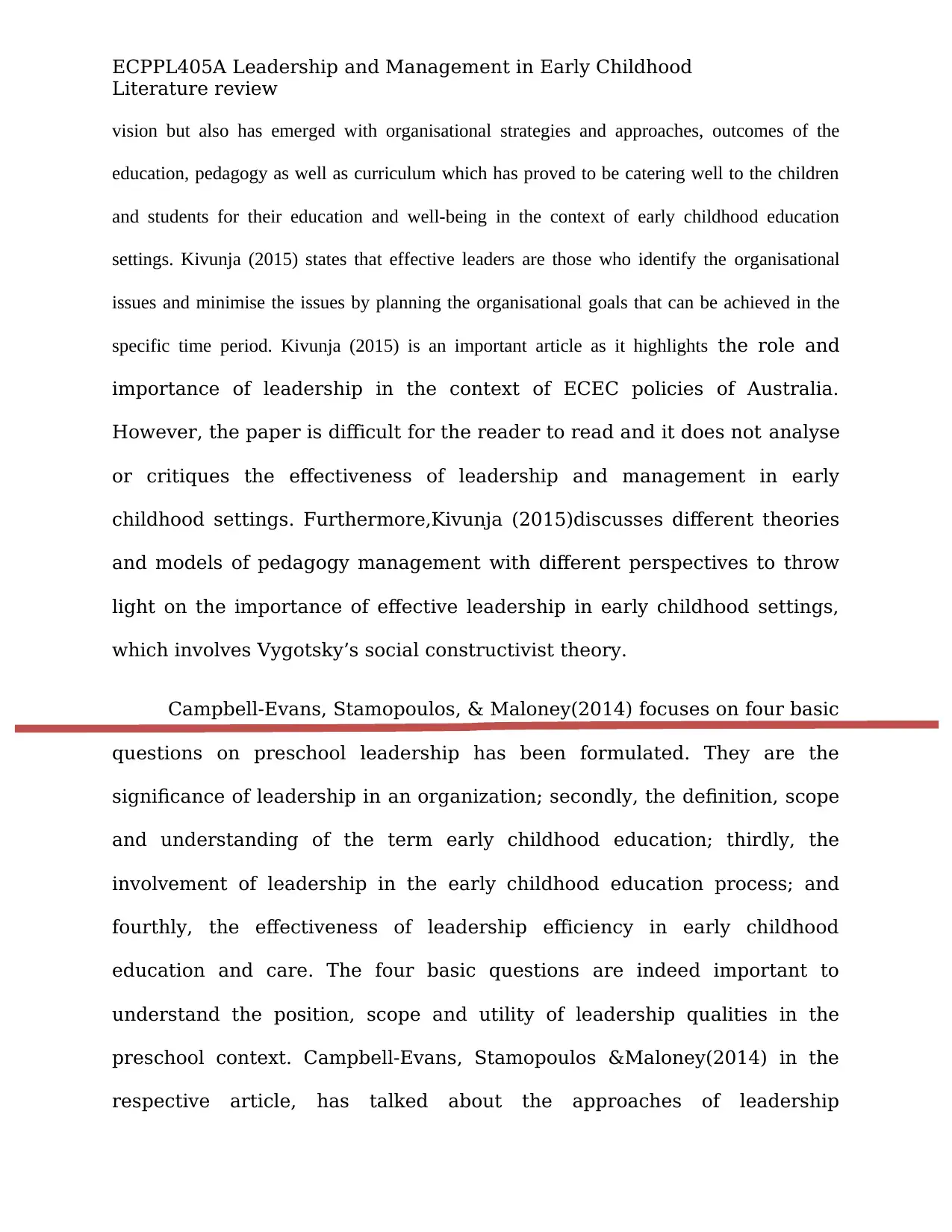
ECPPL405A Leadership and Management in Early Childhood
Literature review
vision but also has emerged with organisational strategies and approaches, outcomes of the
education, pedagogy as well as curriculum which has proved to be catering well to the children
and students for their education and well-being in the context of early childhood education
settings. Kivunja (2015) states that effective leaders are those who identify the organisational
issues and minimise the issues by planning the organisational goals that can be achieved in the
specific time period. Kivunja (2015) is an important article as it highlights the role and
importance of leadership in the context of ECEC policies of Australia.
However, the paper is difficult for the reader to read and it does not analyse
or critiques the effectiveness of leadership and management in early
childhood settings. Furthermore,Kivunja (2015)discusses different theories
and models of pedagogy management with different perspectives to throw
light on the importance of effective leadership in early childhood settings,
which involves Vygotsky’s social constructivist theory.
Campbell-Evans, Stamopoulos, & Maloney(2014) focuses on four basic
questions on preschool leadership has been formulated. They are the
significance of leadership in an organization; secondly, the definition, scope
and understanding of the term early childhood education; thirdly, the
involvement of leadership in the early childhood education process; and
fourthly, the effectiveness of leadership efficiency in early childhood
education and care. The four basic questions are indeed important to
understand the position, scope and utility of leadership qualities in the
preschool context. Campbell-Evans, Stamopoulos &Maloney(2014) in the
respective article, has talked about the approaches of leadership
Literature review
vision but also has emerged with organisational strategies and approaches, outcomes of the
education, pedagogy as well as curriculum which has proved to be catering well to the children
and students for their education and well-being in the context of early childhood education
settings. Kivunja (2015) states that effective leaders are those who identify the organisational
issues and minimise the issues by planning the organisational goals that can be achieved in the
specific time period. Kivunja (2015) is an important article as it highlights the role and
importance of leadership in the context of ECEC policies of Australia.
However, the paper is difficult for the reader to read and it does not analyse
or critiques the effectiveness of leadership and management in early
childhood settings. Furthermore,Kivunja (2015)discusses different theories
and models of pedagogy management with different perspectives to throw
light on the importance of effective leadership in early childhood settings,
which involves Vygotsky’s social constructivist theory.
Campbell-Evans, Stamopoulos, & Maloney(2014) focuses on four basic
questions on preschool leadership has been formulated. They are the
significance of leadership in an organization; secondly, the definition, scope
and understanding of the term early childhood education; thirdly, the
involvement of leadership in the early childhood education process; and
fourthly, the effectiveness of leadership efficiency in early childhood
education and care. The four basic questions are indeed important to
understand the position, scope and utility of leadership qualities in the
preschool context. Campbell-Evans, Stamopoulos &Maloney(2014) in the
respective article, has talked about the approaches of leadership
Paraphrase This Document
Need a fresh take? Get an instant paraphrase of this document with our AI Paraphraser
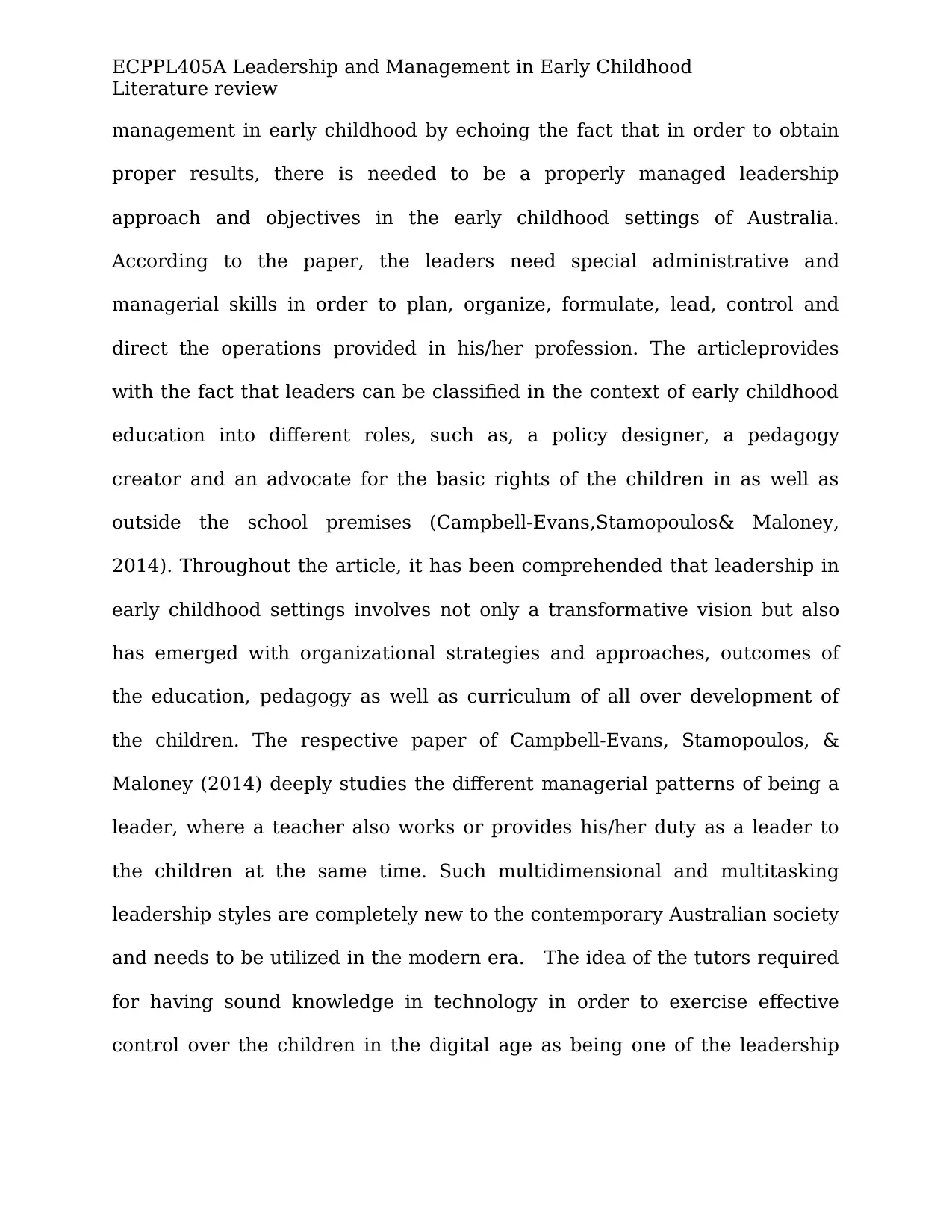
ECPPL405A Leadership and Management in Early Childhood
Literature review
management in early childhood by echoing the fact that in order to obtain
proper results, there is needed to be a properly managed leadership
approach and objectives in the early childhood settings of Australia.
According to the paper, the leaders need special administrative and
managerial skills in order to plan, organize, formulate, lead, control and
direct the operations provided in his/her profession. The articleprovides
with the fact that leaders can be classified in the context of early childhood
education into different roles, such as, a policy designer, a pedagogy
creator and an advocate for the basic rights of the children in as well as
outside the school premises (Campbell-Evans,Stamopoulos& Maloney,
2014). Throughout the article, it has been comprehended that leadership in
early childhood settings involves not only a transformative vision but also
has emerged with organizational strategies and approaches, outcomes of
the education, pedagogy as well as curriculum of all over development of
the children. The respective paper of Campbell-Evans, Stamopoulos, &
Maloney (2014) deeply studies the different managerial patterns of being a
leader, where a teacher also works or provides his/her duty as a leader to
the children at the same time. Such multidimensional and multitasking
leadership styles are completely new to the contemporary Australian society
and needs to be utilized in the modern era. The idea of the tutors required
for having sound knowledge in technology in order to exercise effective
control over the children in the digital age as being one of the leadership
Literature review
management in early childhood by echoing the fact that in order to obtain
proper results, there is needed to be a properly managed leadership
approach and objectives in the early childhood settings of Australia.
According to the paper, the leaders need special administrative and
managerial skills in order to plan, organize, formulate, lead, control and
direct the operations provided in his/her profession. The articleprovides
with the fact that leaders can be classified in the context of early childhood
education into different roles, such as, a policy designer, a pedagogy
creator and an advocate for the basic rights of the children in as well as
outside the school premises (Campbell-Evans,Stamopoulos& Maloney,
2014). Throughout the article, it has been comprehended that leadership in
early childhood settings involves not only a transformative vision but also
has emerged with organizational strategies and approaches, outcomes of
the education, pedagogy as well as curriculum of all over development of
the children. The respective paper of Campbell-Evans, Stamopoulos, &
Maloney (2014) deeply studies the different managerial patterns of being a
leader, where a teacher also works or provides his/her duty as a leader to
the children at the same time. Such multidimensional and multitasking
leadership styles are completely new to the contemporary Australian society
and needs to be utilized in the modern era. The idea of the tutors required
for having sound knowledge in technology in order to exercise effective
control over the children in the digital age as being one of the leadership
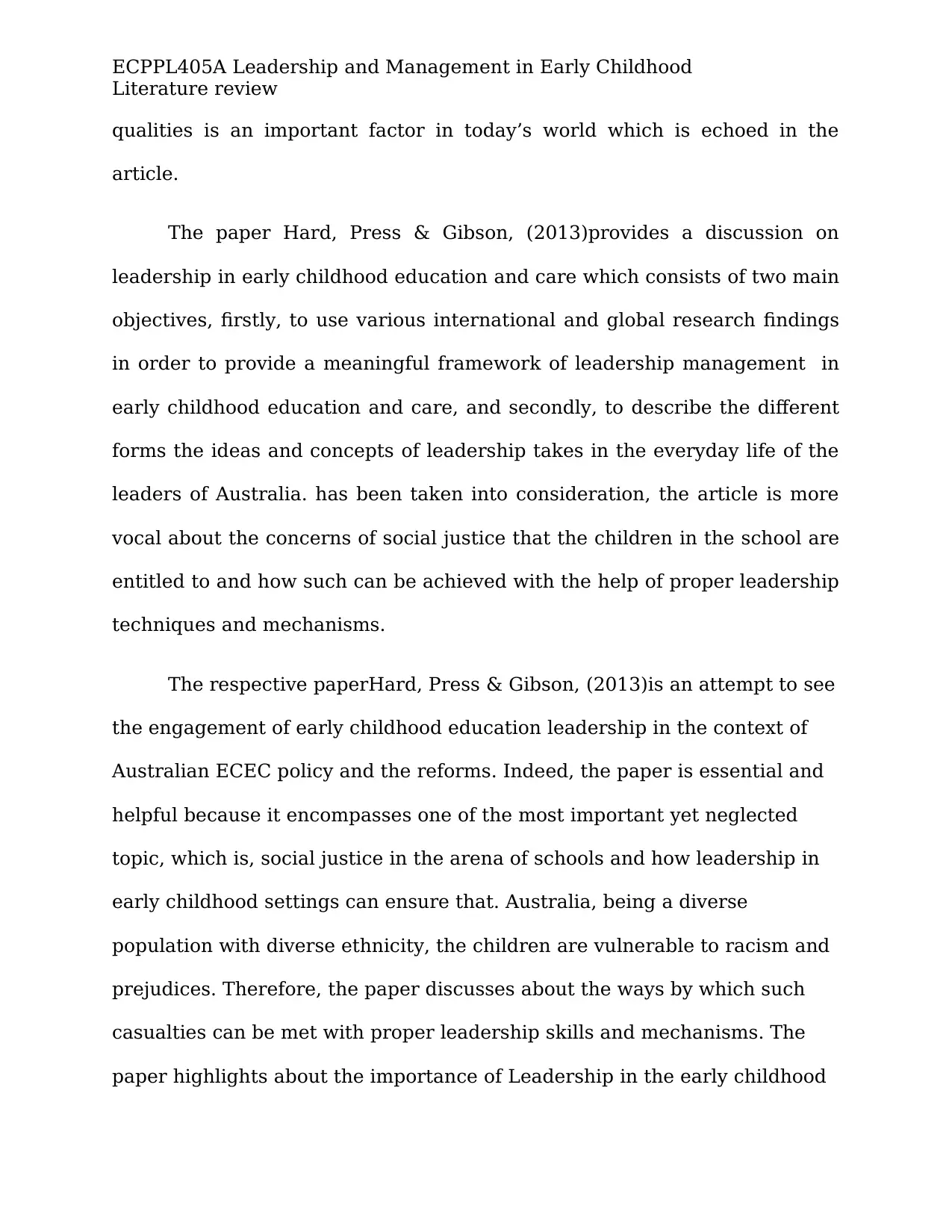
ECPPL405A Leadership and Management in Early Childhood
Literature review
qualities is an important factor in today’s world which is echoed in the
article.
The paper Hard, Press & Gibson, (2013)provides a discussion on
leadership in early childhood education and care which consists of two main
objectives, firstly, to use various international and global research findings
in order to provide a meaningful framework of leadership management in
early childhood education and care, and secondly, to describe the different
forms the ideas and concepts of leadership takes in the everyday life of the
leaders of Australia. has been taken into consideration, the article is more
vocal about the concerns of social justice that the children in the school are
entitled to and how such can be achieved with the help of proper leadership
techniques and mechanisms.
The respective paperHard, Press & Gibson, (2013)is an attempt to see
the engagement of early childhood education leadership in the context of
Australian ECEC policy and the reforms. Indeed, the paper is essential and
helpful because it encompasses one of the most important yet neglected
topic, which is, social justice in the arena of schools and how leadership in
early childhood settings can ensure that. Australia, being a diverse
population with diverse ethnicity, the children are vulnerable to racism and
prejudices. Therefore, the paper discusses about the ways by which such
casualties can be met with proper leadership skills and mechanisms. The
paper highlights about the importance of Leadership in the early childhood
Literature review
qualities is an important factor in today’s world which is echoed in the
article.
The paper Hard, Press & Gibson, (2013)provides a discussion on
leadership in early childhood education and care which consists of two main
objectives, firstly, to use various international and global research findings
in order to provide a meaningful framework of leadership management in
early childhood education and care, and secondly, to describe the different
forms the ideas and concepts of leadership takes in the everyday life of the
leaders of Australia. has been taken into consideration, the article is more
vocal about the concerns of social justice that the children in the school are
entitled to and how such can be achieved with the help of proper leadership
techniques and mechanisms.
The respective paperHard, Press & Gibson, (2013)is an attempt to see
the engagement of early childhood education leadership in the context of
Australian ECEC policy and the reforms. Indeed, the paper is essential and
helpful because it encompasses one of the most important yet neglected
topic, which is, social justice in the arena of schools and how leadership in
early childhood settings can ensure that. Australia, being a diverse
population with diverse ethnicity, the children are vulnerable to racism and
prejudices. Therefore, the paper discusses about the ways by which such
casualties can be met with proper leadership skills and mechanisms. The
paper highlights about the importance of Leadership in the early childhood
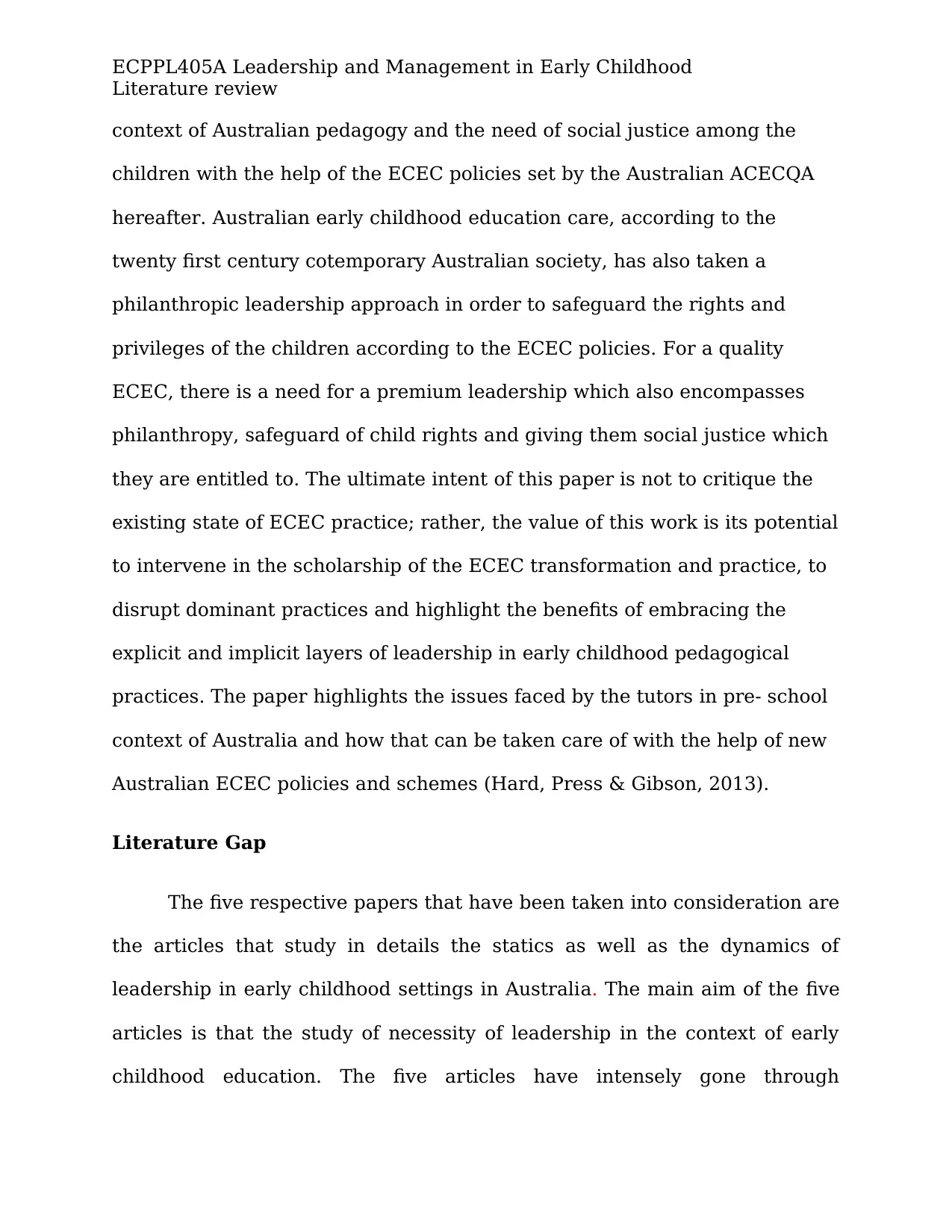
ECPPL405A Leadership and Management in Early Childhood
Literature review
context of Australian pedagogy and the need of social justice among the
children with the help of the ECEC policies set by the Australian ACECQA
hereafter. Australian early childhood education care, according to the
twenty first century cotemporary Australian society, has also taken a
philanthropic leadership approach in order to safeguard the rights and
privileges of the children according to the ECEC policies. For a quality
ECEC, there is a need for a premium leadership which also encompasses
philanthropy, safeguard of child rights and giving them social justice which
they are entitled to. The ultimate intent of this paper is not to critique the
existing state of ECEC practice; rather, the value of this work is its potential
to intervene in the scholarship of the ECEC transformation and practice, to
disrupt dominant practices and highlight the benefits of embracing the
explicit and implicit layers of leadership in early childhood pedagogical
practices. The paper highlights the issues faced by the tutors in pre- school
context of Australia and how that can be taken care of with the help of new
Australian ECEC policies and schemes (Hard, Press & Gibson, 2013).
Literature Gap
The five respective papers that have been taken into consideration are
the articles that study in details the statics as well as the dynamics of
leadership in early childhood settings in Australia. The main aim of the five
articles is that the study of necessity of leadership in the context of early
childhood education. The five articles have intensely gone through
Literature review
context of Australian pedagogy and the need of social justice among the
children with the help of the ECEC policies set by the Australian ACECQA
hereafter. Australian early childhood education care, according to the
twenty first century cotemporary Australian society, has also taken a
philanthropic leadership approach in order to safeguard the rights and
privileges of the children according to the ECEC policies. For a quality
ECEC, there is a need for a premium leadership which also encompasses
philanthropy, safeguard of child rights and giving them social justice which
they are entitled to. The ultimate intent of this paper is not to critique the
existing state of ECEC practice; rather, the value of this work is its potential
to intervene in the scholarship of the ECEC transformation and practice, to
disrupt dominant practices and highlight the benefits of embracing the
explicit and implicit layers of leadership in early childhood pedagogical
practices. The paper highlights the issues faced by the tutors in pre- school
context of Australia and how that can be taken care of with the help of new
Australian ECEC policies and schemes (Hard, Press & Gibson, 2013).
Literature Gap
The five respective papers that have been taken into consideration are
the articles that study in details the statics as well as the dynamics of
leadership in early childhood settings in Australia. The main aim of the five
articles is that the study of necessity of leadership in the context of early
childhood education. The five articles have intensely gone through
Secure Best Marks with AI Grader
Need help grading? Try our AI Grader for instant feedback on your assignments.
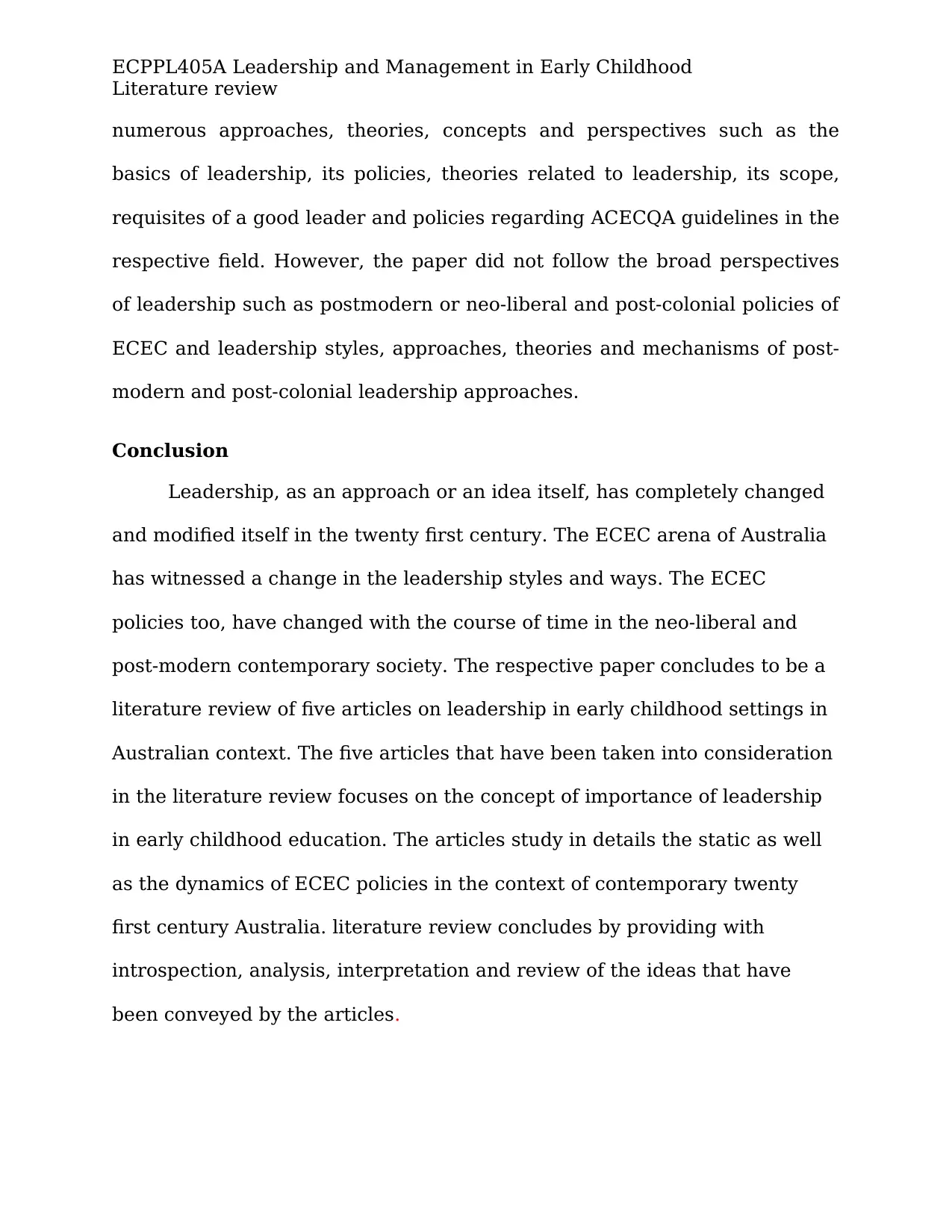
ECPPL405A Leadership and Management in Early Childhood
Literature review
numerous approaches, theories, concepts and perspectives such as the
basics of leadership, its policies, theories related to leadership, its scope,
requisites of a good leader and policies regarding ACECQA guidelines in the
respective field. However, the paper did not follow the broad perspectives
of leadership such as postmodern or neo-liberal and post-colonial policies of
ECEC and leadership styles, approaches, theories and mechanisms of post-
modern and post-colonial leadership approaches.
Conclusion
Leadership, as an approach or an idea itself, has completely changed
and modified itself in the twenty first century. The ECEC arena of Australia
has witnessed a change in the leadership styles and ways. The ECEC
policies too, have changed with the course of time in the neo-liberal and
post-modern contemporary society. The respective paper concludes to be a
literature review of five articles on leadership in early childhood settings in
Australian context. The five articles that have been taken into consideration
in the literature review focuses on the concept of importance of leadership
in early childhood education. The articles study in details the static as well
as the dynamics of ECEC policies in the context of contemporary twenty
first century Australia. literature review concludes by providing with
introspection, analysis, interpretation and review of the ideas that have
been conveyed by the articles.
Literature review
numerous approaches, theories, concepts and perspectives such as the
basics of leadership, its policies, theories related to leadership, its scope,
requisites of a good leader and policies regarding ACECQA guidelines in the
respective field. However, the paper did not follow the broad perspectives
of leadership such as postmodern or neo-liberal and post-colonial policies of
ECEC and leadership styles, approaches, theories and mechanisms of post-
modern and post-colonial leadership approaches.
Conclusion
Leadership, as an approach or an idea itself, has completely changed
and modified itself in the twenty first century. The ECEC arena of Australia
has witnessed a change in the leadership styles and ways. The ECEC
policies too, have changed with the course of time in the neo-liberal and
post-modern contemporary society. The respective paper concludes to be a
literature review of five articles on leadership in early childhood settings in
Australian context. The five articles that have been taken into consideration
in the literature review focuses on the concept of importance of leadership
in early childhood education. The articles study in details the static as well
as the dynamics of ECEC policies in the context of contemporary twenty
first century Australia. literature review concludes by providing with
introspection, analysis, interpretation and review of the ideas that have
been conveyed by the articles.
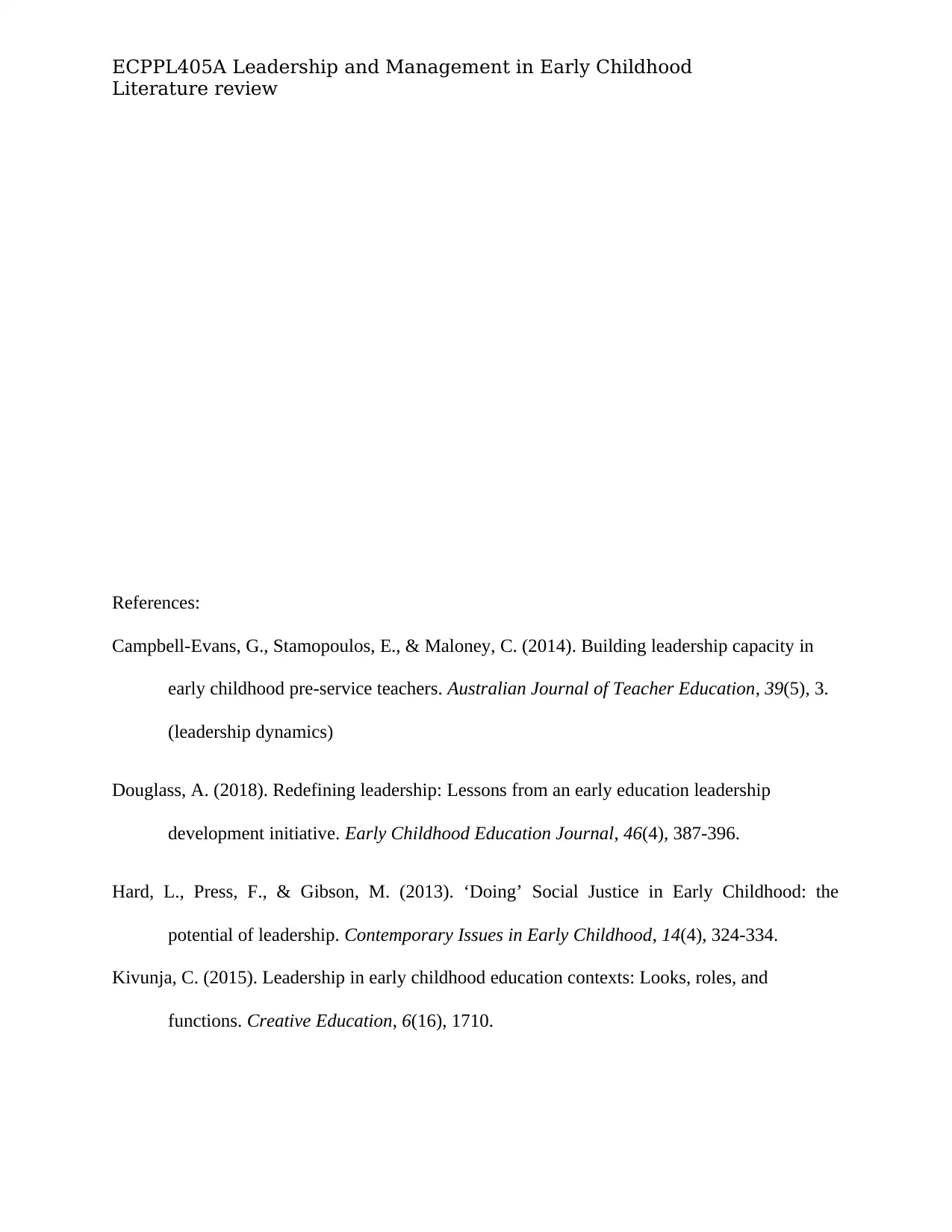
ECPPL405A Leadership and Management in Early Childhood
Literature review
References:
Campbell-Evans, G., Stamopoulos, E., & Maloney, C. (2014). Building leadership capacity in
early childhood pre-service teachers. Australian Journal of Teacher Education, 39(5), 3.
(leadership dynamics)
Douglass, A. (2018). Redefining leadership: Lessons from an early education leadership
development initiative. Early Childhood Education Journal, 46(4), 387-396.
Hard, L., Press, F., & Gibson, M. (2013). ‘Doing’ Social Justice in Early Childhood: the
potential of leadership. Contemporary Issues in Early Childhood, 14(4), 324-334.
Kivunja, C. (2015). Leadership in early childhood education contexts: Looks, roles, and
functions. Creative Education, 6(16), 1710.
Literature review
References:
Campbell-Evans, G., Stamopoulos, E., & Maloney, C. (2014). Building leadership capacity in
early childhood pre-service teachers. Australian Journal of Teacher Education, 39(5), 3.
(leadership dynamics)
Douglass, A. (2018). Redefining leadership: Lessons from an early education leadership
development initiative. Early Childhood Education Journal, 46(4), 387-396.
Hard, L., Press, F., & Gibson, M. (2013). ‘Doing’ Social Justice in Early Childhood: the
potential of leadership. Contemporary Issues in Early Childhood, 14(4), 324-334.
Kivunja, C. (2015). Leadership in early childhood education contexts: Looks, roles, and
functions. Creative Education, 6(16), 1710.
1 out of 12
Related Documents
Your All-in-One AI-Powered Toolkit for Academic Success.
+13062052269
info@desklib.com
Available 24*7 on WhatsApp / Email
![[object Object]](/_next/static/media/star-bottom.7253800d.svg)
Unlock your academic potential
© 2024 | Zucol Services PVT LTD | All rights reserved.





